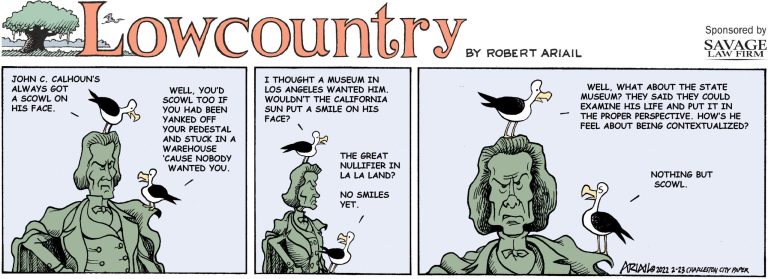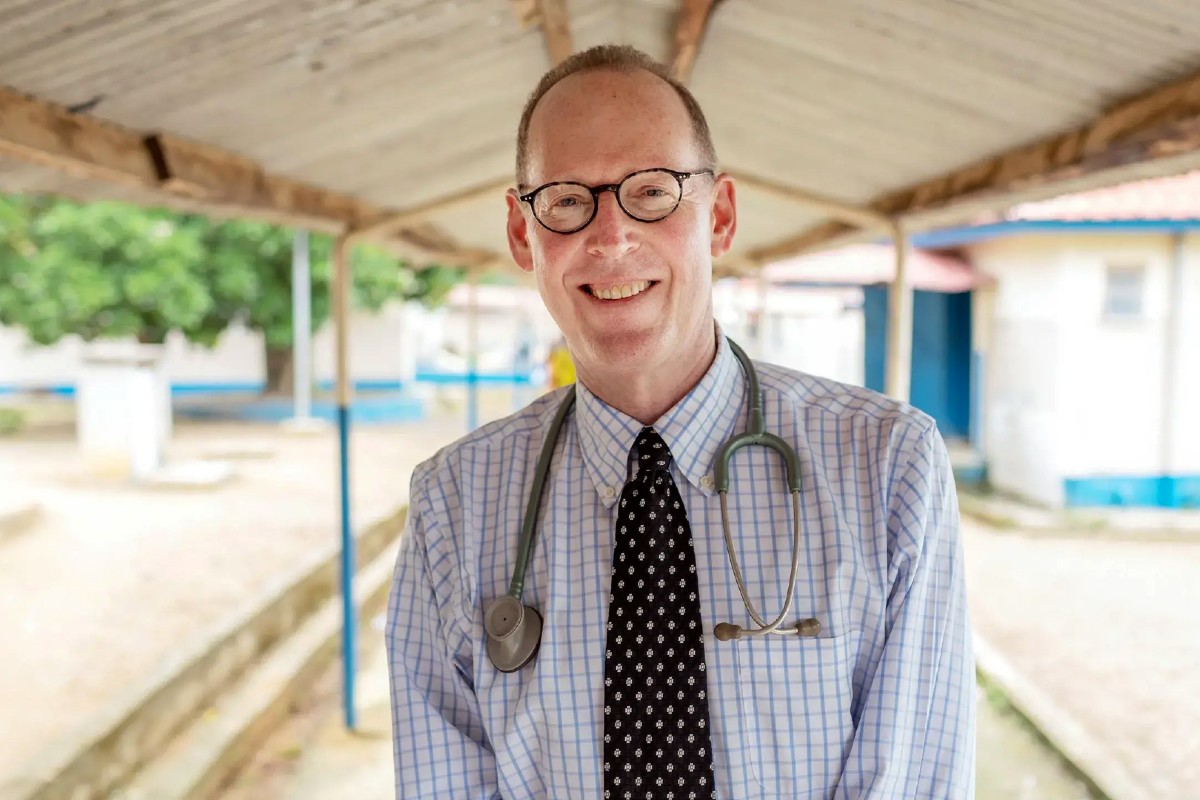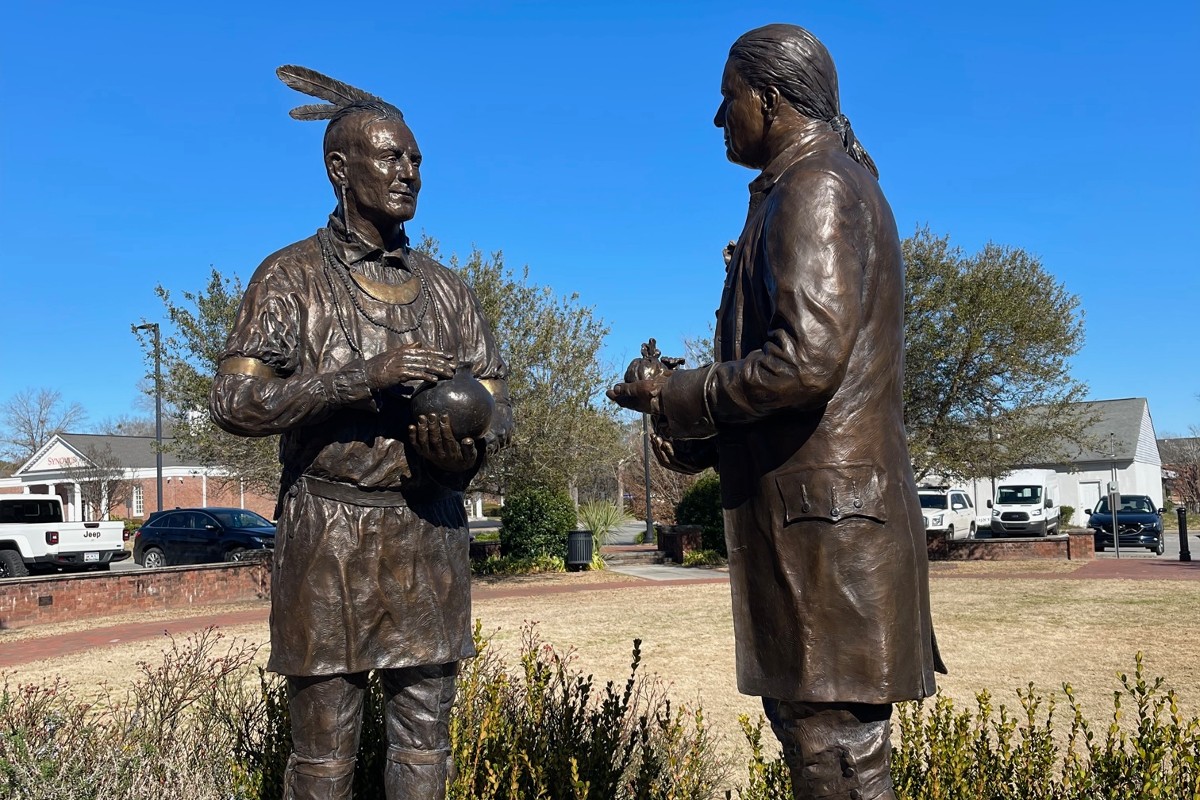STATEHOUSE REPORT | ISSUE 21.08 | FEB. 25, 2022
BIG STORY: Dems few and far between with statewide candidates
NEWS BRIEFS: House committee forwards $14 billion budget to floor
LOWCOUNTRY, Ariail: Calhoun’s scowl
COMMENTARY, Brack: The Farmer who was the world’s doctor
SPOTLIGHT: Charter Communications
FEEDBACK: Our leaders misinterpret data, more
MYSTERY PHOTO: Statuary
Dems few and far between with statewide candidates

By Andy Brack | It’s less than three weeks until candidates can file for legislative and statewide offices and the state Democratic Party has a problem – only three people have declared they’ll run for any of South Carolina’s seven statewide constitutional races.
To date, former U.S. Rep. Joe Cunningham of Charleston and state Sen. Mia McLeod of Columbia are campaigning on the Democratic ticket to replace GOP Gov. Henry McMaster. The only other person to say he is running statewide is Gary Burgess, a former Anderson County superintendent who has run twice for state superintendent as a Republican. This time he’s running as a Democrat to replace GOP Superintendent Molly Spearman, who is retiring. At present, at least six Republican women are running for the superintendent seat.
That means state Democrats don’t yet have candidates to challenge several Republicans, including Attorney General Alan Wilson, Secretary of State Mark Hammond, Treasurer Curtis Loftis, Comptroller General Richard Eckstrom and Agriculture Commissioner Hugh Weathers. The lieutenant governor, also a constitutional officer, runs on the governor’s ticket. The state’s adjutant general used to be elected statewide, but now is appointed.
There’s still time for more statewide candidates to emerge, but the two-week filing period opens March 16.
State party leaders have been mostly mum when asked why there aren’t more Democrats running for statewide office. “No comment,” said one, later adding that he didn’t want to steal the thunder of anyone whose announcement was in the works. “Great question,” another said with a hint of snark.
Another Democratic insider privately quipped, “I have not heard a single name for a single office.”
One reason Democratic leaders may not want to run in down-ballot races is a feeling of futility after U.S. Senate candidate Jaime Harrison raised – and spent – $130 million in a losing 2020 effort to incumbent GOP Sen. Lindsey Graham in the state’s most expensive contest ever. (Graham raised about $113 million and spent $100 million in the race.)
 Furman University political science professor Danielle Vinson said state Democrats are having trouble because the state, now gerrymandered three times into lots of safe Republican legislative seats, has become mostly a one-party state – a kind of red state version of California.
Furman University political science professor Danielle Vinson said state Democrats are having trouble because the state, now gerrymandered three times into lots of safe Republican legislative seats, has become mostly a one-party state – a kind of red state version of California.
“Democrats cannot win a seat if they don’t have a candidate running,” she said. “But who wants to be that candidate who, even under the best of circumstances, has almost no chance of succeeding?
“So, Democrats look for other ways to influence policy and politics – focusing their attention on national politics (see Jaime Harrison) or turning to local politics where there are more opportunities and the party is less decisive in the outcome of elections.”
There’s historical precedent for late statewide announcements from Democratic candidates. Back in 2010, several high-profile Democrats joined races at the last moment, including Matthew Richardson (attorney general), Frank Holleman (superintendent) and Robert Barber (comptroller general). That was, however, also the year that an unknown, Alvin M. Greene, was the Democratic challenger to then GOP U.S. Sen. Jim DeMint.
- Have a comment? Send to: feedback@statehousereport.com.
House committee forwards $14B budget to floor

Staff reports | In a $14 billion budget year where surpluses rule, old-time conservative spending seems to have gone out of the window as S.C. House budget committee members passed a plan Thursday to to give raises to teachers, state employees and law enforcement officers, build new schools, construct a state health lab, and buy more body cameras and bulletproof vests for police officers.
The proposed budget, which House lawmakers will consider in March, also includes an income tax cut that will remove $8 billion from state coffers over the next 10 years. That proposal was passed Wednesday as a separate bill with less than 15 minutes of discussion. Now the bill goes to the state Senate. The House plan would cut the state’s top income tax rate from 7% to 6% over the next six years, a plan tied to economic growth. All other taxpayers would be combined into a 3% bracket. More: AP News, WSPA, WLTX.
In other recent news:
![]() Biden interviews 3 for high court, including S.C.’s Childs. President Joe Biden is on track to decide on a nominee to fill the seat vacated by Justice Stephen Breyer by the end of February, according to reports from the White House. Among the three Black women he has interviewed for the job is U.S. District Judge J. Michelle Childs of South Carolina, a jurist being pushed strongly by powerful U.S. House Rep. Jim Clyburn, D-S.C. More: The Washington Post.
Biden interviews 3 for high court, including S.C.’s Childs. President Joe Biden is on track to decide on a nominee to fill the seat vacated by Justice Stephen Breyer by the end of February, according to reports from the White House. Among the three Black women he has interviewed for the job is U.S. District Judge J. Michelle Childs of South Carolina, a jurist being pushed strongly by powerful U.S. House Rep. Jim Clyburn, D-S.C. More: The Washington Post.
S.C. elections officials prepare to use contested voting maps in 2022 elections. A federal lawsuit that alleges South Carolina’s new state House and congressional maps intentionally discriminate against Black voters is unlikely to prevent those maps from being used in this year’s elections.
S.C. Senate passes hands-free cell phone bill. The state Senate has passed the second of three readings of a bill that bans drivers from holding a cellphone while the vehicle is in motion or face a $100 fine. The bill faces a routine vote before heading to the House, which has failed to pass similar bills in recent years.
Ban on modified trucks gains momentum after bill passes S.C. Senate. A bill making it illegal to drive a “Carolina Squat” modified truck on South Carolina’s highways passed the Senate overwhelmingly, with drivers and law enforcement officers at odds about the dangers of such vehicles.
Family of man who died in S.C. jail pushes for hate crime bill. Jamal Sutherland’s parents appeared Wednesday with members of the Black Legislative Caucus in an effort to urge state lawmakers to pass a hate crimes law and a bill specifying excessive force by police officers as illegal.
Federal court upholds ruling blocking S.C. abortion ban. A federal appeals court on Tuesday upheld a ruling blocking the enforcement of South Carolina’s fetal heartbeat law, which would ban most abortions after six weeks of pregnancy.
Why high gas prices might actually encourage S.C. tourism. A vast majority of those visiting Myrtle Beach drive to the destination, making it seem like the recent spike in gas prices would negatively impact the city. But Coastal Carolina University hospitality professor Taylor Damonte said that over the years, he’s noticed a positive correlation between fuel prices and how busy the region gets during the peak travel season. More: The State
- Want more headlines every business day that are like this? Visit our friends at SC Clips.
Calhoun’s scowl

Cartoonist Robert Ariail often interprets things a little differently, but always has an interesting take on what’s going on in South Carolina. Love the cartoon? Hate it? What do you think: feedback@statehousereport.com.
The Farmer who was the world’s doctor

By Andy Brack, editor and publisher | It’s still easy to visualize Paul Farmer walking across the quad at Duke University on a blustery day. He wore a navy wool coat pulled tight against his wiry frame. He leaned forward, energetically pushing into the cold.
 I remember how Farmer’s intense blue eyes shone with a piercing intellect. Looking back, I wish we had become more than casual acquaintances – guys who nodded to each other at a party or had fleeting conversations.
I remember how Farmer’s intense blue eyes shone with a piercing intellect. Looking back, I wish we had become more than casual acquaintances – guys who nodded to each other at a party or had fleeting conversations.
He became what more than one person described as THE Paul Farmer – the internationally acclaimed doctor of “social medicine” who treated the poor in faraway impoverished places like Haiti and Rwanda. That Paul Farmer was a rock star in the world of global health – a guy that 81-year-old Dr. Anthony Fauci described as a mentor, even though Fauci was 19 years older.
Farmer, a Harvard-trained doctor on the faculty of the same school, died earlier this week in Africa doing what he did, providing compassionate care for those with nothing. Author of a dozen books, he pushed, nudged, cajoled, pontificated and engaged with world and medical leaders to get them to do the right thing to curb suffering. He once said, “So I can’t show you how, exactly, health care is a basic human right. But what I can argue is that no one should have to die of a disease that is treatable.”
Across South Carolina and the nation are thousands of health care professionals who are crestfallen at his death this week, apparently from a heart condition.
“I think this compassionate approach to getting health care to those who needed it most (but usually were not in a position to pay for it) made him a beloved and inspirational global health leader,” said University of South Carolina anthropology and public health professor David Simmons. “Additionally, he created structures (clinics, hospitals, teaching hospitals, and even a university in Rwanda) that helped facilitate this mission as well as train local generations of health care professionals to continue the work.”
Simmons, 55, was surprised when Farmer accepted an invitation in 1999 to join his dissertation review committee at Michigan State University. He still has the notes Farmer made on his work.
“His ability to walk in the shoes of the people he was working with and ministering to was something that he communicated with countless students and the lay public who read his work.”
Simmons said Farmer’s books have been used widely in South Carolina’s colleges to teach lessons of compassion in public health, medicine, global health and anthropology. As a medical student, Farmer co-founded Partners in Health, a nonprofit that started to help alleviate suffering in Haiti that grew into a global leader.
Greg Elmore, a fourth-year medical student at the Medical University of South Carolina, was reading Farmer’s latest book on the day he died.
“Many medical schools, including MUSC, are moving towards a focus on health equity and understanding the social determinants of health,” said Elmore, a former Peace Corps volunteer in Zambia. “I think Paul’s work has played a large focus on this shift. Thanks to his work and the work of others like him, there will be a whole generation of medical students graduating who will work to reduce health care disparities in our state which, needless to say, has some of the worst health care outcomes for non-white patients in the country.”
Kathleen Ellis, executive director of MUSC’s Center for Global Health, recalled a brief meeting with Farmer after a Boston panel discussion a few years ago in which they talked about Ebola virus in West Africa. “Within minutes, hundreds of students crowded around him as if this was a backstage session with John Lennon after a Beatles concert. What struck me was that he did not try to walk away or cut the students short, but started an open dialogue. He patiently answered questions and gave advice on how to prepare for a career in global public health.”
Farmer was a true educator who drove relentlessly to improve others’ lives and health outcomes. We need more like him.
Angels are all around us. Look around to make sure you don’t miss them.
Paul Edward Farmer Jr. (1959-2022). Rest in peace.
Andy Brack, editor and publisher of Statehouse Report, also is publisher of the Charleston City Paper. Have a comment? Send to: feedback@statehousereport.com.
Charter Communications
 The public spiritedness of our underwriters allows us to bring Statehouse Report to you at no cost. Today, we’re happy to shine the spotlight on Charter Communications, the nation’s fastest-growing TV, internet and voice company. Committed to integrating the highest quality service with superior entertainment and communications products, Charter is at the intersection of technology and entertainment, facilitating essential communications that connect 24 million residential and business customers in 41 states, including South Carolina. In addition to being committed to giving back to the communities we serve, the bedrock of our business strategy is to serve our customers and exceed their expectations.
The public spiritedness of our underwriters allows us to bring Statehouse Report to you at no cost. Today, we’re happy to shine the spotlight on Charter Communications, the nation’s fastest-growing TV, internet and voice company. Committed to integrating the highest quality service with superior entertainment and communications products, Charter is at the intersection of technology and entertainment, facilitating essential communications that connect 24 million residential and business customers in 41 states, including South Carolina. In addition to being committed to giving back to the communities we serve, the bedrock of our business strategy is to serve our customers and exceed their expectations.
“We, at our core, are a service organization,” President and CEO Tom Rutledge says. “And every product we sell has a huge service component.”
- To learn more, visit Charter’s South Carolina services online.
Our leaders misinterpret data
To the editor:
Among the grosser errors S.C. leaders often make centers on interpreting the data. (The other is ignoring it). The data on change, growth and in-migration misinferred. Population growth does not confirm the existing policies as “working.”
S.C. engages in bribery (incentives) to attract companies – businesses that are not motivated to be here. S.C. is buying jobs. We need to examine the merchandise by disclosing the quality of the jobs we are buying. We don’t.
The tax discounts come from the state’s future revenues. That use denied addressing our other needs including education. The annual revenue shortfall was replaced in the annual calculations applied to all the taxpayers.
– Fred Palm, Edisto Island, S.C.
On Tomfoolery and funny math
To the editor:
You are right on the ridiculous posturing tax cut and education. All the estimates I have seen make about $100 more per year to the average person. That won’t even cover the cost to the state tax people to rewrite all the tax paperwork..
Tomfoolery and funny math … and in a state with people constantly complaining about roads and education and Medicaid and health care.
– Tim Cunningham, Florence, S.C.
Send us your thoughts
We receive a few comments a week and look forward to publishing. But often we can’t because we can’t verify the identity of the writer. To be published, you’ve got to provide us with contact information so we can verify your letters. Verified letters to the editor are published weekly. We reserve the right to edit for length and clarity. Comments are limited to 250 words or less. Please include your name and contact information.
- Send your letters or comments to: feedback@statehousereport.com
Statuary

A longtime reader sent in this mystery statuary for you to identify. Where and what is it? Send your guess to feedback@statehousereport.com — and remember to include your name, home city and contact information.
 Last week’s mystery, “Peachy,” was the biggest stumper we’ve had in a long time. More people gave a wrong answer than the right one. Thanks to Randy Herald of Lexington for sending in the photo.
Last week’s mystery, “Peachy,” was the biggest stumper we’ve had in a long time. More people gave a wrong answer than the right one. Thanks to Randy Herald of Lexington for sending in the photo.
Loads of people guessed it was the Peachoid water tower in Gaffney. Nope. Look more closely … you can see windows that house a projection room at the “Big Mo” drive-in theater in Monetta near Aiken. Hats off to the few and proud who correctly guessed: Don Clark of Hartsville; Elizabeth Jones and Jay Altman, both of Columbia; George Graf of Palmyra, Va.; Allan Peel of San Antonio, Texas; Pat Keadle of Wagener; and Will Williams of Aiken.
Send us a mystery. If you have a photo that you believe will stump readers, send it along (but make sure to tell us what it is because it may stump us too!) Send to: feedback@statehousereport.com and mark it as a photo submission. Thanks.
ORDER NOW: Copies are in Lowcountry-area bookstores now, but if you can’t swing by, you can order a copy online today.
ABOUT STATEHOUSE REPORT
Statehouse Report, founded in 2001 as a weekly legislative forecast that informs readers about what is going to happen in South Carolina politics and policy, is provided to you at no charge every Friday.
- Editor and publisher: Andy Brack, 843.670.3996
Donate today
We’re proud to offer Statehouse Report for free. For more than a dozen years, we’ve been the go-to place for insightful independent policy and political news and views in the Palmetto State. And we love it as much as you do.
But now, we can use your help. If you’ve been thinking of contributing to Statehouse Report over the years, now would be a great time to contribute as we deal with the crisis. In advance, thank you.
Buy the book
Now you can get a copy of editor and publisher Andy Brack’s We Can Do Better, South Carolina! ($14.99) as a paperback or as a Kindle book ($7.99). . The book of essays offers incisive commentaries by editor and publisher Andy Brack on the American South, the common good, vexing problems for the Palmetto State and interesting South Carolina leaders.
More
- Mailing address: Send inquiries by mail to: P.O. Box 21942, Charleston, SC 29413
- Subscriptions are free: Click to subscribe.
- We hope you’ll keep receiving the great news and information from Statehouse Report, but if you need to unsubscribe, go to the bottom of the weekly email issue and follow the instructions.
- Read our sister publication: Charleston City Paper (every Wednesday in print; Every day online)
- © 2022, Statehouse Report, a publication of City Paper Publishing, LLC. All rights reserved.



